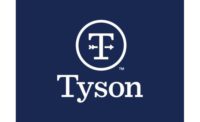Tyson Foods announced the results of its third quarter. Sales were $10.022 billion, down from 2019’s total of $10.885 billion. Net income dropped from $681 million to $527 million. Sales from thr first nine months of the year stand at $31.725 billion, a slight increase from 2019’s $31.521 billion.
“Without a doubt, our third fiscal quarter was one of the most volatile and uncertain periods I’ve seen during my time in the industry,” said Noel White, Tyson Foods’ CEO. “However, our commitment to team member health and safety and investments in operations and portfolio strategy effectively positioned us to weather unprecedented COVID-19 marketplace volatility while allowing us to support our farmers, ranchers and producers and meet our customers’ needs.”
“I want to thank our team members for their dedication and diligence as we continue to navigate the COVID-19 pandemic. At Tyson Foods, our focus remains on ensuring the health and safety of our team members, their families and our communities. We take this responsibility very seriously, and we’re proud that our team members have gone above and beyond to help us supply food for the nation.”
“Within each of our segments, we absorbed higher-than-normal operating costs related to COVID-19. Nonetheless, Tyson delivered strong results during the third quarter led by strength in our Beef and Pork segments. Despite short-term challenges, we’re maintaining a clear focus on the long term. Our fourth quarter is off to a solid start, and while COVID-19 has been disruptive, we have a strong long-term outlook for Tyson Foods.”
Sales declined across all operating segments, with Tyson’s beef segment dropping to $3.653 billion from $4.157 billion in 2019. Tyson stated that sales volume decreased in the third quarter and the first nine months of fiscal 2020 primarily due to lower production throughput associated with the impact of COVID-19 in the third quarter of fiscal 2020 and a reduction in live cattle harvest capacity as a result of a fire that caused the temporary closure of a production facility for the majority of the first quarter of fiscal 2020.
“We continue to proactively manage the company and its operations through this global pandemic,” the company said in its fiscal report. “Given the nature of our business, demand for food and protein may shift amongst sales channels and experience disruptions, but over time we expect worldwide demand to continue to increase. We are experiencing multiple challenges related to the pandemic. These challenges are anticipated to increase our operating costs and negatively impact our volumes for the remainder of fiscal 2020 and into fiscal 2021. Operationally, we have faced and expect to continue to face capacity utilization slowdowns in production facilities from team member absenteeism and choices we make to ensure team member health and safety. The lower levels of productivity and higher costs of production we have experienced will likely continue until COVID-19 is better understood and its impacts diminish. Each of our segments has also experienced a shift in demand from foodservice to retail; however, the volume increases in retail have not been sufficient to offset the losses in foodservice and as a result, we expect decreases in volumes in the last quarter of fiscal 2020 in our Chicken and Prepared Foods segments. We cannot currently predict the ultimate impact that COVID-19 will have on our short- and long-term demand, as it will depend on, among other things, the severity and duration of the COVID-19 crisis. Our liquidity is expected to be adequate to continue to run our operations and meet our obligations as they become due. Due to the inability to reasonably quantify the total impact of COVID-19 to our operations, we are not currently providing segment adjusted operating margin guidance.”
Source: Tyson Foods



Report Abusive Comment